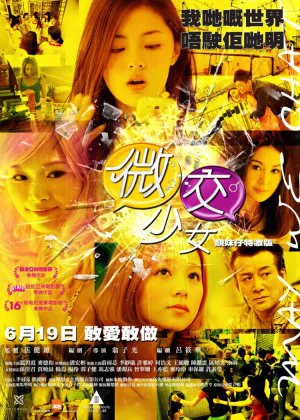May We Chat
Movie details

Look hard and long and you'll find a few (wayward) youth films in Hong Kong's sizeable filmography. From all the films I've seen I can only remember Heiward Mak's Lit Yat Dong Hung, a worthy entry that deserves more love. Looking back a little further there's also David Lai's Lonely Fifteen, a film that's closely connected to this one. With that in mind, it's safe to say that Philip Yung's May We Chat [Mei Gaau Siu Nui] is a welcome film, regardless of quality. And luckily, Yung shows a lot of promise and delivers a fine, yet surprisingly edgy drama.

While Hong Kong cinema is doing pretty well for itself, it seems perpetually stuck in producing the same kind of films. If you're looking for some good genre movies (action, comedy and crime mostly) then you have plenty to choose from, but outside of those flagship genres it can be quite a barren place. And it's not like they're not trying or actually doing a terrible job with other genres, there just doesn't appear to be any real support for the films that venture away from the beaten path.
Point in case: May We Chat. It's smart, good-looking, edgy and provocative, but reactions to the film have been overly tepid. That is, reactions from the few people that actually watched it. I do have to admit that it's probably not the easiest film to sell, HK audiences are clearly not big fans of provocative cinema and the topic can be quite daunting for foreigners not used to Asian youth culture. But putting all that aside, this is a film that would suit many Western film fests looking for a hidden gem to brighten up their program.
May We Chat follows the lives of three girls lost in a sea of people. They crave attention, but for different reasons nobody is there to take care of them. Wai-Wai lives in poverty and raises her younger sister while doing some odd jobs to survive, deaf-mute Ying goes on paid dates to escape life with her dementing grandmother and Yan suffers from romantic troubles while living separated from her mother and father. The three keep each other company through WeChat, a popular phone chat app that connects people in a nearby area. When Yan disappears from the app, Wai-Wai and Ying meet up to find out what happened to her.

On the visual side of things there's very little to complain about. Sure enough the film looks a bit flashy and poppy in places, but that particular look is functional, aptly reflecting the world of the film's main characters. Underneath that layer of pink gloss hides a film with precise framing, strong lighting and use of color and inspired camera work. It seems as though Yung took a few pointers from Taiwanese cinema in that regard, definitely not a bad source of inspiration when making a drama film. Add a few stand-out scenes and you have a looker of a film.
The soundtrack is a little less adventurous. While there are a few traditional drama pieces (of the piano/string kind), most of the soundtrack is based on Chinese pop music. I'm not a connoisseur of the Hong Kong music scene though, so I might be mistaken, but don't expect too much in the way of a thrilling soundtrack. That said, it goes well with the setting and it isn't truly grueling to listen to, so I won't complain too much, but May We Chat could've benefited from either classier or edgier musical choices.
Taking up the parts of the main characters are three novice actresses. Kabby Hui, Rainky Wai and Heidi Lee perform well, especially considering their lack of experience and the challenging roles they were given. Youthful energy is essential for a like this and between the three of them there clearly is no lack of it. One can only hope that the limited nudity in the film won't stain the rest of their careers, seeing how prude Hong Kong can be. Also interesting are the additions of Irene Wan and Tak-woh Mak, both reprising their roles from Liang Mei Zai. While May We Chat is hardly a sequel to Lai's film, it offers a little extra context that adds to theme of the film.

Thematically May We Chat offers a contemporary update of the problems youngster in Hong Kong are facing. The digital age is very much present, but even so the challenges and issues they are dealing with haven't changed all that much through the years. In that sense the film isn't a critique on the digital age or its up-and-coming citizens, it just shows how young people today are using these tools to communicate with each other. What you take from that has probably more to say about your own views and ideas than any explicit commentary the film is making.
Not only is May We Chat a very welcome and needed addition to the Hong Kong filmography, it's also a great film regardless. The acting is strong, the film looks beautiful and the problems the characters face feel genuine. Yung doesn't seem to judge his subjects, nor is the film a one-sided warning against a derailing generation of youngster. Here's to hoping the film can inspire other directors in Hong Kong to venture more outside of their walled gardens, but looking at the reception of May We Chat I fear chances are slim. Whatever the case, Yung made a superb film and deserves all the credit for taking this much risk.